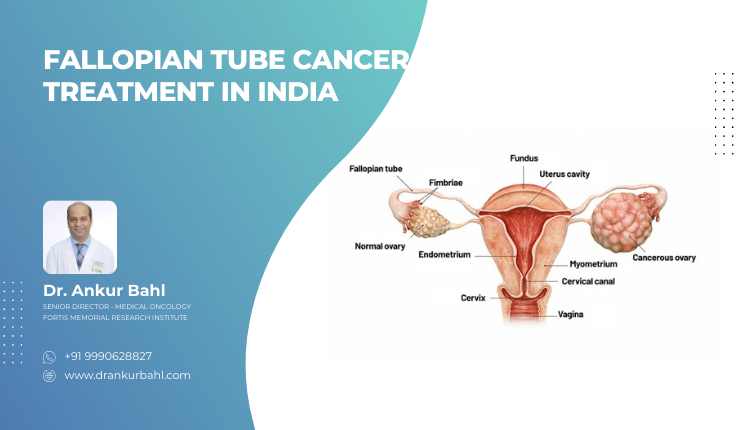Fallopian Tube Cancer Treatment in India

Fallopian Tube Cancer is a rare but serious gynecological cancer requiring precise diagnosis and expert care. India offers world-class treatment at a fraction of international costs, with comprehensive oncology support. The average cost for treatment in India ranges from $4,000 to $7,000.
What Is Fallopian Tube Cancer?
Fallopian Tube Cancer originates in the tubes connecting the ovaries to the uterus. It is rare, accounting for less than 2% of all gynecological cancers. It may be primary (starting in the tubes) or secondary (spread from nearby organs like the ovaries or uterus).
Most cases occur in women over 50 and are often linked to genetic mutations like BRCA1/2. Its similarity to ovarian cancer can sometimes delay diagnosis, making early detection crucial.
What Are the Common Types and Risk Factors?
Types:
- Primary Fallopian Tube Carcinoma (PFTC): Originates directly in the fallopian tube.
- Secondary Fallopian Tube Cancer: Spreads from ovarian or endometrial cancer.
Risk Factors:
- BRCA1 or BRCA2 genetic mutations
- Family history of ovarian or breast cancer
- Age over 50
- History of pelvic inflammatory disease (PID)
- Never having given birth (nulliparity)
What Are the Symptoms and How Is It Diagnosed?
Symptoms:
- Abnormal or watery vaginal discharge
- Lower abdominal or pelvic pain
- Unexplained vaginal bleeding (especially postmenopausal)
- Feeling of a pelvic mass or bloating
- Increased urinary urgency
Diagnostic Approach in India:
- Pelvic Ultrasound/TVS for initial detection
- CA-125 Blood Test – elevated levels indicate possible cancer
- CT Scan / MRI / PET-CT for staging and spread
- Biopsy (often via laparoscopy)
- Genetic testing for BRCA mutation if familial cancer is suspected
What Is the Treatment Protocol in India?
India follows international cancer care guidelines (like NCCN and ESMO) and uses a multi-modality approach.
1. Surgery:
- Total Abdominal Hysterectomy (TAH)
- Bilateral Salpingo-Oophorectomy (BSO) – removal of ovaries and tubes
- Omentectomy – removal of abdominal fat layer where cancer may spread
- Debulking Surgery – removing as much tumor as possible
2. Chemotherapy:
- Combination of Paclitaxel + Carboplatin
- Usually 6 cycles given every 3 weeks
- Reduces recurrence and treats microscopic disease
3. Radiation Therapy:
- Rarely used unless there’s a recurrence or inoperable case
- Delivered via IMRT or IGRT machines for targeted precision
4. Targeted Therapy:
- For patients with BRCA mutation or platinum-resistant cancer
- Drugs include Bevacizumab, Olaparib, Rucaparib
Why Choose India for Fallopian Tube Cancer Treatment?
- Globally accredited hospitals (JCI/NABH certified)
- Oncologists trained in the US/UK
- Comprehensive care centers with all services in one place
- Cost-effective treatments without compromising quality
- Quick appointments, no wait times
- International patient support: visas, interpreters, translators, and accommodation help
Why Choose Dr. Ankur Bahl?
- Senior Consultant Medical Oncologist with 20+ years of experience
- Specializes in gynecologic and rare cancers
- Treats patients from over 30 countries
- High patient satisfaction and treatment success rate
- Offers teleconsultations and long-term remote follow-up care
What Types of Treatments and Devices Are Used?
Surgical Tools:
- Laparoscopic and robotic-assisted surgical equipment
- Harmonic scalpel, bipolar cautery, advanced suture systems
Chemotherapy Delivery:
- Infusion pumps
- Central venous access via port-a-caths
Radiation Technology:
- IMRT (Intensity Modulated Radiation Therapy)
- IGRT (Image Guided Radiation Therapy)
What Is the Treatment Journey for a Foreign Patient?
- Teleconsultation with Indian oncologist using existing reports
- Treatment Plan and cost estimate provided
- Visa Invitation Letter issued by the hospital
- Travel to India and hospital admission
- Surgery & Chemotherapy as per protocol
- In-Hospital Recovery, discharge with post-care instructions
- Virtual Follow-up Care after returning home
What Is the Cost Breakdown for Treatment in India?
|
Service |
Estimated Cost (USD) |
|
Initial Consultation |
$50 – $100 |
|
Imaging & Diagnostics |
$500 – $800 |
|
Surgery (Hysterectomy & BSO) |
$2,000 – $3,500 |
|
Chemotherapy (6 cycles) |
$1,500 – $2,400 |
|
Radiation Therapy (if required) |
$1,200 – $2,000 |
|
Targeted Therapy (if needed) |
$1,000 – $2,000/month |
|
Hospital Stay & Medications |
$700 – $1,200 |
|
Total Estimated Cost |
$4,000 – $7,000 |
International Cost Comparison
|
Country |
Average Cost (USD) |
|
India |
$4,000 – $7,000 |
|
United States |
$25,000 – $40,000 |
|
Thailand |
$10,000 – $18,000 |
India delivers comparable quality at 70–85% lower cost.
Importance of Early Treatment
Starting treatment early ensures:
- Higher survival rates (Stage I: up to 85%)
- Fewer complications
- More conservative procedures
- Lower cost
- Faster recovery
India’s advanced diagnostics and fast scheduling enable early-stage intervention.
What Travel & Visa Support Do Indian Hospitals Offer?
- Medical visa invitation letters
- Airport pickup
- Hotel/apartment assistance
- Multilingual staff and interpreters
- Post-treatment follow-up via video calls
Frequently Asked Questions
Yes, especially if diagnosed early. Surgery combined with chemotherapy offers high survival rates.
Usually 3–5 months, including surgery and chemotherapy recovery.
Yes, including BRCA1/2 and other hereditary panels.
Many hospitals assist with insurance paperwork or accept direct billing if pre-approved.
No. English is widely spoken. Interpreters are available for Arabic, French, Spanish, and African languages.
You’ll receive treatment records, prescriptions, and teleconsultation access.
Most patients are fit to travel within 2–3 weeks after final treatment.